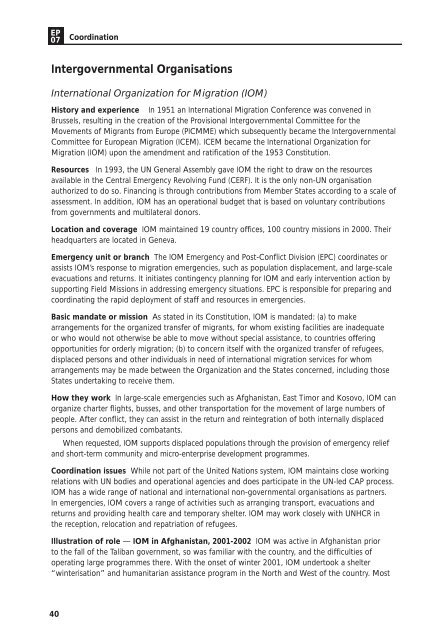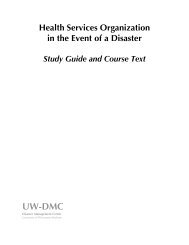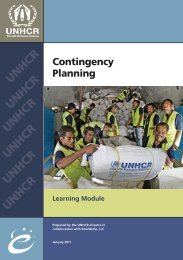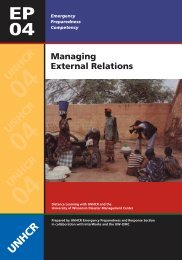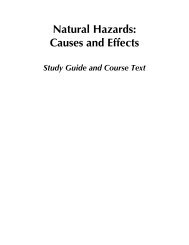Coordination - Disaster Management Center - University of ...
Coordination - Disaster Management Center - University of ...
Coordination - Disaster Management Center - University of ...
You also want an ePaper? Increase the reach of your titles
YUMPU automatically turns print PDFs into web optimized ePapers that Google loves.
EP07<strong>Coordination</strong>Intergovernmental OrganisationsInternational Organization for Migration (IOM)History and experience In 1951 an International Migration Conference was convened inBrussels, resulting in the creation <strong>of</strong> the Provisional Intergovernmental Committee for theMovements <strong>of</strong> Migrants from Europe (PICMME) which subsequently became the IntergovernmentalCommittee for European Migration (ICEM). ICEM became the International Organization forMigration (IOM) upon the amendment and ratification <strong>of</strong> the 1953 Constitution.Resources In 1993, the UN General Assembly gave IOM the right to draw on the resourcesavailable in the Central Emergency Revolving Fund (CERF). It is the only non-UN organisationauthorized to do so. Financing is through contributions from Member States according to a scale <strong>of</strong>assessment. In addition, IOM has an operational budget that is based on voluntary contributionsfrom governments and multilateral donors.Location and coverage IOM maintained 19 country <strong>of</strong>fices, 100 country missions in 2000. Theirheadquarters are located in Geneva.Emergency unit or branch The IOM Emergency and Post-Conflict Division (EPC) coordinates orassists IOM’s response to migration emergencies, such as population displacement, and large-scaleevacuations and returns. It initiates contingency planning for IOM and early intervention action bysupporting Field Missions in addressing emergency situations. EPC is responsible for preparing andcoordinating the rapid deployment <strong>of</strong> staff and resources in emergencies.Basic mandate or mission As stated in its Constitution, IOM is mandated: (a) to makearrangements for the organized transfer <strong>of</strong> migrants, for whom existing facilities are inadequateor who would not otherwise be able to move without special assistance, to countries <strong>of</strong>feringopportunities for orderly migration; (b) to concern itself with the organized transfer <strong>of</strong> refugees,displaced persons and other individuals in need <strong>of</strong> international migration services for whomarrangements may be made between the Organization and the States concerned, including thoseStates undertaking to receive them.How they work In large-scale emergencies such as Afghanistan, East Timor and Kosovo, IOM canorganize charter flights, busses, and other transportation for the movement <strong>of</strong> large numbers <strong>of</strong>people. After conflict, they can assist in the return and reintegration <strong>of</strong> both internally displacedpersons and demobilized combatants.When requested, IOM supports displaced populations through the provision <strong>of</strong> emergency reliefand short-term community and micro-enterprise development programmes.<strong>Coordination</strong> issues While not part <strong>of</strong> the United Nations system, IOM maintains close workingrelations with UN bodies and operational agencies and does participate in the UN-led CAP process.IOM has a wide range <strong>of</strong> national and international non-governmental organisations as partners.In emergencies, IOM covers a range <strong>of</strong> activities such as arranging transport, evacuations andreturns and providing health care and temporary shelter. IOM may work closely with UNHCR inthe reception, relocation and repatriation <strong>of</strong> refugees.Illustration <strong>of</strong> role — IOM in Afghanistan, 2001-2002 IOM was active in Afghanistan priorto the fall <strong>of</strong> the Taliban government, so was familiar with the country, and the difficulties <strong>of</strong>operating large programmes there. With the onset <strong>of</strong> winter 2001, IOM undertook a shelter“winterisation” and humanitarian assistance program in the North and West <strong>of</strong> the country. Most40


